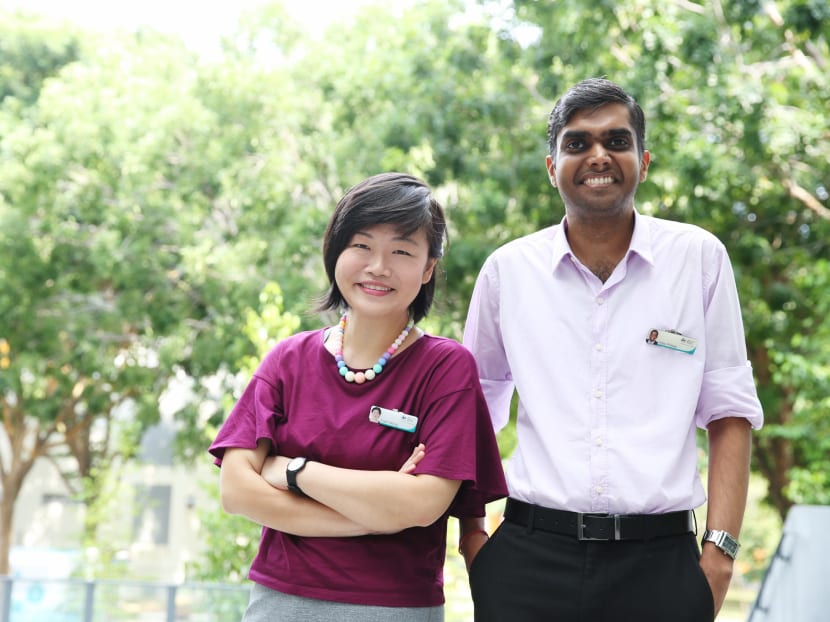New apprenticeship scheme in 2018 for mental health peer support specialists
SINGAPORE — A decade ago, Ms Faith Wong, 36, would go through the same routine every week. She would feel suicidal over the weekend and by Monday, she would be exhausted on the job. She would then finish one week’s worth of work on Wednesday in a manic rush before mentally “crashing” on Friday.

(Left to right) Ms Faith Wong, 36, and Mr Vijay Pratap, 31, who are peer support specialists with the Institute of Mental Health. Photo: Koh Mui Fong/TODAY
SINGAPORE — A decade ago, Ms Faith Wong, 36, would go through the same routine every week. She would feel suicidal over the weekend and by Monday, she would be exhausted on the job. She would then finish one week’s worth of work on Wednesday in a manic rush before mentally “crashing” on Friday.
Being diagnosed with bipolar disorder and having to cope with the condition while holding down a fulltime job was very difficult, she recalled, saying that she was in “perpetual depression” then. Now she is running her own lamp-making business.
Then there is Mr Vijay Pratap, 31, who was diagnosed with psychosis in late 2010. He suffered from paranoia, constantly feeling like he was being watched. He also heard voices in his head for two years. When these sensations began consuming him at night time, he slept just two hours daily on average.
His illness threatened to ruin the events management business he was running with a partner. He managed to do two events during that time, and it taught him the importance of having support from an understanding partner.
Ms Wong and Mr Vijay, who are recovered mental health patients, are now working as peer support specialists at the Institute of Mental Health (IMH), offering a listening ear or advice to other mental health sufferers.
As peer support specialists, Ms Wong and Mr Vijay may also get to apply for a new apprenticeship scheme, to be rolled out by the National Council of Social Service (NCSS) early next year.
This apprenticeship scheme, done in partnership with government agency Workforce Singapore and social service organisations, aims to help peer support specialists get back into the workforce with less stress, encourage employers to hire former mental health patients, as well as reach out to people who do not wish to disclose their condition but are well enough to work.
Those on the scheme will receive a training allowance during a trial period for up to six months. Employers may then assess if they are suitable for the job during the trial, before they commit to the job in the long term.
As part of this roll-out, NCSS will also engage consultants to help social service organisations better integrate these peer support specialists.
The peer support specialists programme, which was piloted in February and co-developed by IMH and NCSS, trains people who have recovered from their mental health conditions so that they may help others like them.
In February, the first batch of 23 trainees, including Ms Wong and Mr Vijay, successfully completed their 180-hour training and received their certificates in peer support. Last month, another 20 completed their training.
There are now 16 peer support specialists working in various mental healthcare settings, such as IMH, Singapore Anglican Community Services (SACS), and Caregivers Alliance Limited.
At SACS, three peer support specialists work alongside those recovering from mental health issues and talk about their personal experiences in a support group. They also partner therapy aides to organise rehabilitation programmes, such as social outings and cooking activities.
Mr James Chan, executive director of the psychiatric services division at SACS, told TODAY: “For Singapore to be an inclusive society, there should not be this discrimination (against former mental health sufferers). Companies also need to believe that people with mental health issues can contribute.”
He added: “They have certain talents and strengths, and companies should continue to value them as unique individuals.”
At SACS, there is an Employee Assistance Programme, done in collaboration with NCSS, where employers and human resources personnel receive training and go through workshops to learn how to help former mental health patients better adjust to the workplace.
These employees may also seek psychological support through face-to-face counselling, or by email and phone chats.
Mr Chan said that SACS began reaching out to interested companies and organisations around July this year to join this programme.
He noted that while there is a “big improvement” in the number of people willing to open up about mental health issues compared to a few decades ago, there is always room for more.
In a Singapore Mental Health Study conducted by IMH in 2010, it was found that 86.5 per cent of employees with mental health issues did not ever seek help for their problems.
Ms Wong said: “People want to talk about it, but don’t know how or who to ask.”
One of the advantages of being a peer support specialist is that it gives her “an instant passport of trust” when it comes to getting patients to open up, something doctors or psychiatrists may not have right away, she said.
“It’s like when you’re running a marathon... peer support specialists are like those who have passed the finishing line and come back to tell those who are still running that there’s only 2km left to go, that they are going to run with you, and they know the pain you are going through.”











